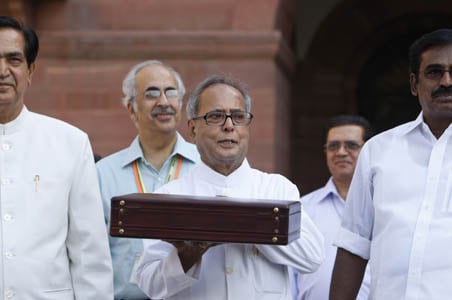
In a pro-poor, rural-oriented Budget, Finance Minister Pranab Mukherjee on Monday raised personal income tax exemption by at least Rs 10,000, abolished IT surcharge and Fringe Benefit Tax, while focusing on jobs, cheap food for poor and loans for farmers.
In a Budget that fulfills a number of Congress' poll promises while battling the pressures of global slowdown, Mukherjee focused on infrastructure and agriculture sector to push economic growth to nine per cent.
The industry welcomed the Budget, saying it is a job well done given the trying circumstances, but had reservations on the hike in Minimum Alternate Tax (MAT) and absence of details on disinvestment programme. The stock markets reacted strongly and tanked about 900 points on the issue of 6.8 per cent fiscal deficit, the highest in 18 years, and lack of sops for areas like housing, steel and infrastructure.
Mukherjee raised the personal income tax exemption by Rs 15,000 for senior citizens (above 65 years) and by Rs 10,000 for others including women and abolished FBT that would help employers in giving more benefits to employees.
The Budget, providing for an expenditure of Rs 10.20 lakh crore, kept the corporate tax, customs, excise and service tax rates unchanged but changes in specific duties would make gold, silver and textile products costly, while making LCD TV and branded jewellery cheaper.
It also provides for 25 kg rice and wheat for poor at Rs three a kg, a guaranteed minimum Rs 100 a day rural job, a national electronic job exchange and over Rs 71,000 crore provision for social sector scheme.
While mentioning that work had begun on enacting a National Food Security law, Mukherjee also extended by six months the farmers debt waiver programme -- a populist scheme that may have helped the Congress score big with voters.
He said the debt waiver scheme, announced during 2008-09 Budget, would be extended till December 31 this year, in view of delay in monsoon. The Rs 71,000 crore scheme, which covered four crore farmers, had ended in June 2009.
The Centre has allocated Rs 411 crore more in this Budget for the purpose of interest subvention to farmers over and above the allocation made during the interim Budget.
Though concerned that the fiscal deficit would shoot to 6.8 per cent this year from 2.7 per cent last year on account of three stimulus packages, Mukherjee said that efforts would be made to set it right immediately after the effects of global slowdown wane.
Announcing a slew of measures, both short-term and medium-term to spur the economy and at the same time bring fiscal deficit in line with the FRBM Act at the earliest, he said additional resources would be mobilised through disinvestment.
However, the Budget set a target of a modest Rs 1,100 crore as proceeds from disinvestment in the current fiscal.
The Budget was also clear that the government would retain control in its banks and insurance entities and not allow its stake to go below 51 per cent in other entities. It set in motion a mechanism to decontrol petro-fuel prices and an expert group would advise how to synchronise the domestic fuel prices with global level.
Elaborating on the Budget proposals, the Finance Ministry later said that two PSUs -- Oil India Ltd and power utility NHPC -- would be listed in due course.
The total budgeted expenditure of Rs 10,20,838 crore, including Rs 3,25,149 crore towards plan expenditure, reflects an overall growth of 36 per cent over the previous year. This is for the first time, total expenditure has crossed the Rs ten lakh crore mark.
On the other hand, gross tax receipts are estimated at Rs 6.41 lakh crore, compared to Rs 6.87 lakh crore, given the possibility of economic downturn persisting in the current year, though Mukherjee maintained that the two worst quarters for the economy due to global crisis were behind.
However, the increased deficit necessitated raising Rs four lakh crore through borrowings, which is more than the total spend on plan investment. The increased reliance on borrowings would entail a massive interest outgo -- Rs 2.25 lakh crore this fiscal, up from about Rs 1.91 lakh crore.
India Inc largely welcomed the initiative for attaining nine per cent economic growth, but said that areas like Securities Transaction Tax and Minimum Alternate Tax should have caught the government's favourable attention. But the markets were punishing and tanked 869 points.
Political parties, including SP and BJP, were not so kind in their assessment of the Budget, although Prime Minister Manmohan Singh hailed it, saying, "The Finance Minister has done an admirable job". Its focus was on rural development and minimising the impact of global recession.
Track Latest News Live on NDTV.com and get news updates from India and around the world

